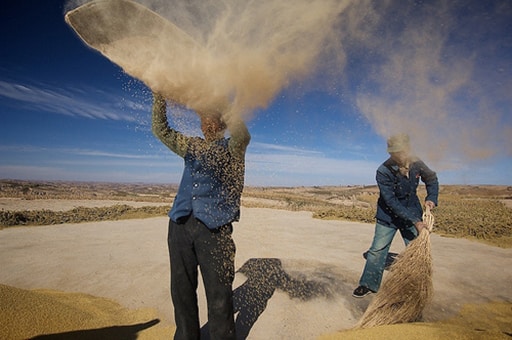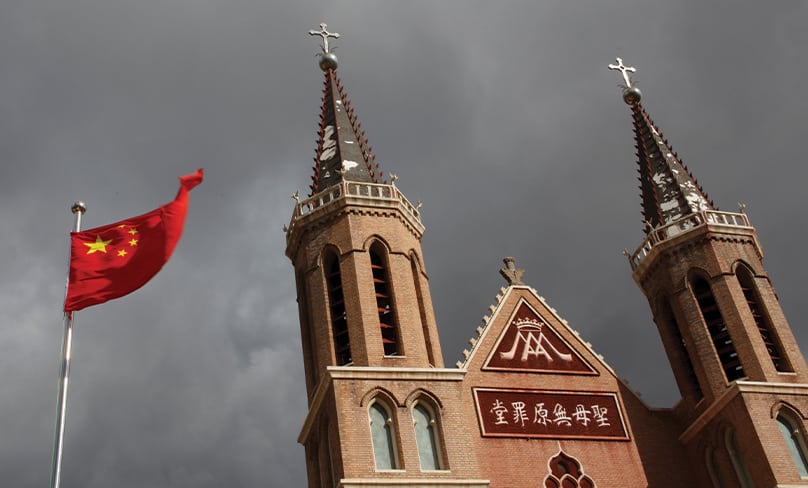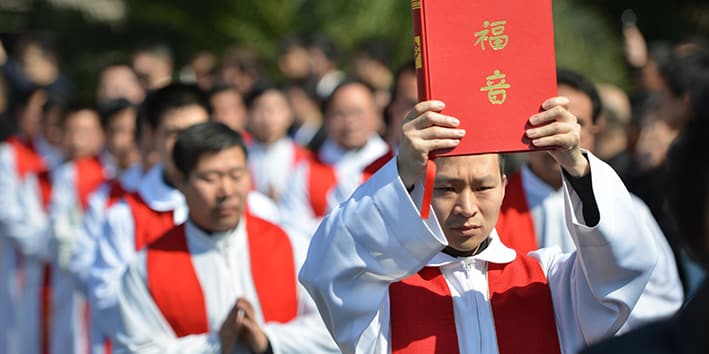
There is a story in the Bible about how David came to buy something called “a threshing floor” as a site on which to build an altar to God. It is a story which I believe may have something to teach us in these days of plague. First, we need to know that a threshing floor is a space used to separate grain from its husks. You cannot grind grain into flour without separating it from the rest of the plant, by first threshing, and then winnowing. Nowadays farmers use machines, but in David’s time people would thresh the wheat (or a similar crop) by stamping on it on a threshing floor to make the grains emerge.
The story comes from the end of King David’s life and was told first in the Second Book of Samuel and, later on, in the First Book of Chronicles. Both books of course are Scripture and therefore “inspired by God and profitable for teaching, for reproof, for correction, and for training in righteousness” (2 Tim 3:6).
As the Second Vatican Council put it, “the books of Scripture must be acknowledged” to be teaching “that truth which God wanted put into sacred writings for the sake of salvation” (Dei Verbum n.11).
According to 2 Samuel 24 the Lord became angry with Israel and “incited David against them”, telling him to take a census (2 Sam 24:1). The census is completed but David is stricken with remorse and acknowledges that what he did in ordering the census was a sin. This is strange. How can David have sinned since he was doing what the Lord wanted? We need to remember two things. First, it is clear that David’s sin comes about because Israel as a whole was guilty of sin (the Lord was already angry at Israel). Second, and more generally, we cannot recoil at surface inconsistencies in Scripture. We cannot demand that the Bible, written by many humans over a long time period, be capable of the same easy comprehension as (for example) articles in The Catholic Weekly. When we do not understand something in the Bible, we must hold it in place in our hearts like our Lady (Lk 3:51) confident that understanding will come. And understanding will come because although the Bible had many human authors it has one Sacred Author, God.
In fact, 1 Chronicles 21 smooths the story over by saying that Satan “stood up against Israel and incited David” (1 Chr 21:1) to conduct the census. We should remember that no temptation comes but by the permission of the God who also grants the grace to resist it.
The story goes on. The Lord accepts David’s contrition and, through the prophet Gad, invites him to choose his punishment (2 Sam 24:12-14): three years of famine, or three months of military defeat, or three days of pestilence. David chooses the three days of pestilence. In the three days seventy thousand of David’s people die.

The angel bringing the plague is about to send it upon Jerusalem when the Lord says “it is enough”. The angel stops “by the threshing floor of Araunah the Jebusite”. The Jebusites were the previous inhabitants of Jerusalem who were incorporated into David’s kingdom when he conquered the city (2 Sam 5). In 2 Chronicles the name is spelt differently but, in any case, it appears not to be a name but a title meaning “lord”. It suggests that this Araunah was the original ruler of Jerusalem. This was presumably where the wheat grown near Jerusalem was threshed to make grain for bread.
Back to David’s plague. He can see the angel “striking down the people” and begs the Lord for mercy (2 Sam 24:17): “I have sinned … but these sheep, what have they done?”. He offers himself as a substitute. The Lord tells David to erect an altar on the Jebusite’s threshing floor, so David goes to buy it, insisting on paying full price (2 Sam 24:18-25). David builds an altar and offers sacrifice, “and the plague was averted from Israel”.
We may smile at a plague which only lasts three days when we have begun isolating ourselves for an indefinite period to stop the spread of a deadly disease. I have read this story several times in the past, but only now have I begun to wonder at the meaning of the strange detail about the threshing floor.
And then there is the more urgent question, where is Araunah’s Threshing Floor for us? How will this end?
The narrative of the Books of Samuel continues into the First Book of Kings which includes the account of David’s son Solomon building the temple in Jerusalem (1 Kg 6). It is implied that the precise site of the temple was the threshing floor purchased by David. This is made explicit in the account in Chronicles (2 Chr 3:1) and it suggests an answer to my question. The temple was built on a space where the raw ingredients for bread were made and, once it was built, it became the only place where it was lawful to offer sacrifice to God. The temple’s sacrifice was wholly replaced by Christ’s sacrifice on the cross (and the temple itself was soon destroyed). Now our Lord’s sacrifice is made present again for us at each Mass, when the Body and Blood of Christ are offered up under the appearances of Bread and Wine. The meaning of the temple’s location becomes clear.
It is true that there is a bitter irony that today’s plague, which came from mainland China, has spread so far because of the pride and brutality of the gangsters in charge of the People’s Republic of China. In order to combat the plague our country, like so many others, has adopted policies to prevent public worship which are eerily similar to those of Communist China. We now get to share in a small way with our fellow Catholics in China who have been progressively deprived of the right to practise the Faith.

By no means evade the restrictions on public gatherings so that you can attend Mass. By staying away, when the Bishops urge us to do so, we can join (in a smaller way) all those Catholics who have been prevented by arbitrary power from joining in the Church’s public worship. Learn how to unite yourself spiritually to any Mass which is being celebrated right now. Be happy that you can get a small taste of, and join, the sufferings of your fellow Catholics. And when this trial passes, and you can go to Mass again, make sure never to forget.
Thomas Flynn lectures in Latin and Greek at Campion College, where he also tutors in Theology
Related Articles
Churches cast light despite locked doors
Across Europe, churches offer empty facilities to help fight COVID-19
Church bells to ring, uniting prayers
